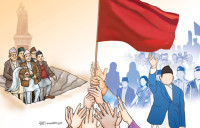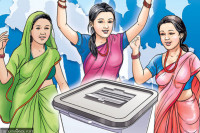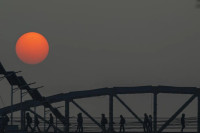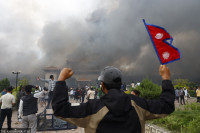Opinion
Pity the children
Education sector in Nepal has been badly disturbed by both the embargo and the earthquake
Bal Krishna Basnet
The year 2072 BS was probably the worst year in the history of Nepal. The country had to struggle from the undeclared Indian embargo and the devastating April earthquake. The trade embargo has adversely affected the daily lives of people in general and the poor in particular. First and foremost, the fuel crisis that has resulted from the blockade has pushed the people to destruct the verdant forest for cooking purposes, not only in the villages but also in the cities where the government is selling the firewood. Second, the blockade has led to an acute shortage of life saving drugs. Third, scarcity of fuel and other commodities has halted the reconstruction efforts and black marketeering has become rampant in the country. Against this background, the education sector is not an exception and has been severely hit, which is the main concern of this article.
Missing days
Education plays a vital and crucial role for the development of every nation. The fuel crisis and shortage of liquefied petroleum gas has impacted the everyday life of all the students, the most striking force of the educational system; teachers, the driving force and the school and college administrators, the managerial forces.
Parents were startled when they received notice from schools and colleges stating their closure because the busses had to queue at the petrol pumps for fuel. The school or college management was sorry for the inconvenience but had no other choice due to the prevailing situation. Owing to the earthquake, in the beginning of the year, the educational institutions had closed for more than 35 days in the urban areas. But in many of the quake-affected districts, schools have been completely destroyed. According to the Post Disaster Need Assessment report, 7,000 schools were completely or significantly damaged by the April quake. Additionally, in the Tarai region, schools have been affected even more. Due to the unrest in the area, schools were closed for more than three months and even now classes have not resumed properly.
Way ahead
In this context, the main concern of the parents and their children is the completion of the courses of study and the proper outcome of their investment by the end of the academic session. The worries
are festering even more among those students and their parents who will be appearing for the School Leaving Certificate (SLC) examination—the iron gate of the secondary level education system in Nepal. Thus, the government needs to show some consideration and should either hold the SLC examination later than the usual schedule or reduce the syllabus for the examination to what the teachers have been able to finish so far. If this is not carried out by the government, then it might not be fair to the children.
Moreover, the melee in the Madhes and its impact on the educational milieu in the region is not something new. In Nepal,
political protests have always hampered the education sector. The only admonition that can be given this time is to implement the declaration of educational institutions as zones of peace. It is imperative for the government and the political parties to realise that only education can lead this country towards progress and development, so the state needs to do all that it can to protect the future of this country, that is, the children of today.
Basnet is principal of Urbana Montessori School at Lohakinthali, Bhaktapur




 7.12°C Kathmandu
7.12°C Kathmandu
.jpg&w=200&height=120)









